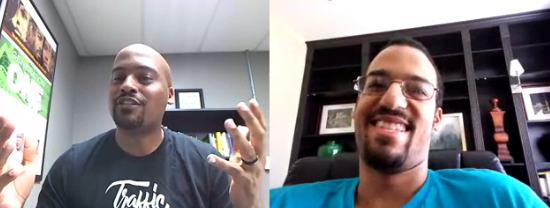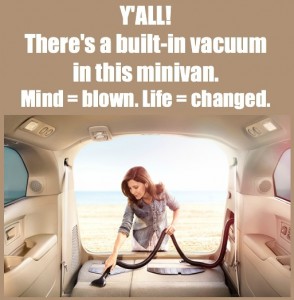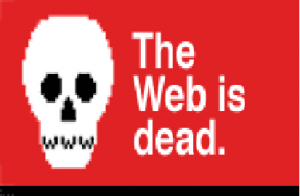In August 2010, Wired Magazine published an article entitled The Web is Dead. Long Live the Internet. The authors describe the dramatic change in the way people use the internet compared to how it’s been used in the past 15 years.
“Sure, we’ll always have Web pages,” Chris Anderson says. “We still have postcards and telegrams, don’t we?”
But as technology evolves and our use of it adapts, the traditional ways businesses have used the internet to build their brands and expand their influence will no longer be effective to the same degree. What worked yesterday simply will not work tomorrow. You may have noticed that downward trend is already taking impacting your online efforts.
Take a quick mental inventory of the time you’ve spent online lately. What are some of the traits you notice? Avalanches of information, often conflicting other sources. Mediocre content quality. Spam and scams. Wild pitch fests.
And everyone is an “expert,” even if they’re not.
Do you remember high school economics class? One of the first concepts you learn is supply and demand. As the supply of anything increases, its value decreases. On the internet, we’ve pretty much reached the maximum capacity for information demand, but the supply continues to grow exponentially.
So, you see the two causes for the general decline of perceived value of online information: 1) the low quality of the majority of content and 2) the super-abundance and ease of access.
On some level, everyone over the age of 16 senses this deterioration.
Seth Godin, one of the most popular marketing minds in the world recently wrote in his blog:
“…Prepare for a continuous erosion of what you pay for digital content, at the same time we’ll see a sticky and upward trend for what you might be charged for the… the scarce or custom.”
The world wide web is increasingly becoming a content flea market, so much so that internet giants like Yahoo and AOL are struggling with their current business models.
Don’t misunderstand. Although it seems contradictory, the internet is more important than ever. The rules are changing, and you will have to modify your online initiatives to take full advantage.
Counteract This Trend
To overcome the quality erosion of online information, you absolutely must offer something unique and indisputably valuable. You also have to be able to successfully deliver it to your core audience, the people who can most benefit from what you have to offer. Exclusivity can also protect the perception of high worth around your content.
Unique – It’s cliché, but you have to be yourself. Do the hard work of getting to know yourself and defining your Unique Value Proposition (UVP). Then you have to get the message out.
A large percentage of your peers heavily model themselves and their business after someone they admire. Modeling makes sense – up to a point. But imitation is a problem.
Legendary adman Bruce Barton notes that everyone possesses a “single spark of divinity that sets you off and makes you different from every other living creature.” Nurture that spark instead of copying someone else’s.
Not only do you have to have a one-of-a-kind persona, you have do conduct business in a way that differs from your competitors.
- What can you do that others can’t or won’t do?
- What do your clients experience while working with you that no one else can claim to provide?
- How can you reach your audience in a way that the competition doesn’t?
Valuable – Everything you do should be impressive. Your personal brand and your reputation depend on showing yourself to be someone who improves the lives of others, not a peddler trying to sell stuff. (People love to buy, but they hate to be sold.)
Value starts with understanding what your target audience wants and needs, then helping them attain those things. A hefty percentage of people online are openly egocentric and their efforts online revolve around trying to suck money out of their customers’ wallets.
Quite a few businesses, entrepreneurs and service providers adhere to an online strategy that emphasizes quantity over quality. The more pages you have on your website, the more visible it becomes to search engines. More articles on more directories put you in front of more potential clients. Blogging every day will keep readers from forgetting about you and help you stay relevant…
That’s a lot of pressure! Placing so much attention to creating large quantities of content makes it difficult to make each piece shine. All of the information you make available to clients and prospects is a reflection of who you are and what you’re about. If your content is highly-visible but poorly crafted or boring, what have you accomplished? Not much more than demonstrating to more people that you’re nothing special. The last thing you want to be is average (or worse).
Search engine optimization (SEO) is another facet of your promotional efforts that can be tricky. Do you write to be attractive to search engines or to have the biggest impact on your readers?
Of course, you want to rank well in search rankings. There are benefits to being on Google’s first page. But, again, if you spend your effort to please the algorithms search engines use (which are constantly changing), you can lose out on opportunities to communicate more powerfully with your audience.
Focus on value. Remember that quality trumps quantity every day of the week
Exclusive – You are unique and valuable. You are not a commodity. Being too available decreases your sense of worth. Exclusivity gives the impression that your content and services are even more valuable. Make potential clients qualify themselves through opt-ins, purchases or other requirements.
Making some of your material available only to qualified individuals heightens the value and significance of that material.
The same is true for making some of your content or products only available in physical copies rather than electronic form. That increases your fulfillment costs, but that is part of what makes going offline work. It feels more expensive. Your prestige factor increases when your readers and listeners know that you’re “putting your money where your mouth is.” (This will also force you to deliver high-level quality because it costs you time and money to produce these items.)
Examples:
- books
- CDs
- DVDs
- print newsletter (free, paid or bundled with another service or product)
- columns in print magazines
This distinguishes you from nearly all of your competitors and everyone else online. Rarity increases actual consumption of your content. Your teachings have little effect if they never enter your clients’ brains and get put to use.
Exclusivity builds a sense of belonging and entitlement. The effect creates a formidable emotional and intellectual bond between your audience and you, even while they’re forgetting everyone else.








